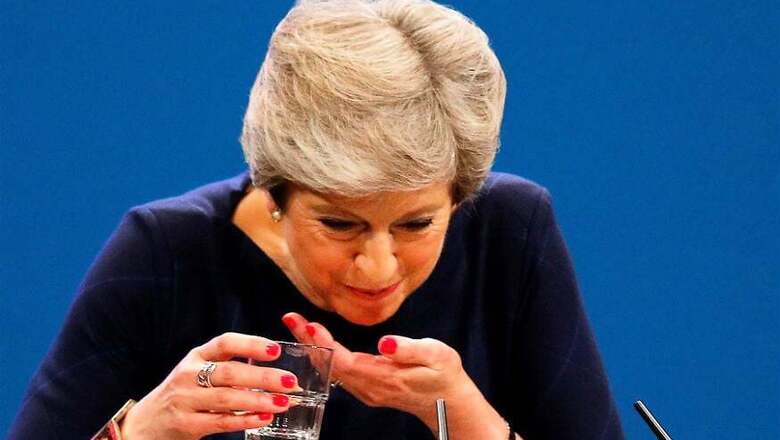
views
London: Lawmakers in British Prime Minister Theresa May's Conservative Party who are trying to oust her as leader have been told to "shut up" by senior party members, including potential rival Boris Johnson, Britain's foreign minister.
Others in the party warned that the uncertainty over May was damaging Brexit negotiations with the European Union.
May on Friday said she would remain as leader after a former Conservative chairman said he had garnered the support of 30 lawmakers who wanted her to quit.
It followed a disastrous speech at the party's conference earlier this week and a snap election in June in which May lost her party's majority in parliament.
Her keynote speech at party conference last week was disrupted by a serial prankster who handed her an end of employment form, and she then suffered a series of coughing fits which made her combative message barely audible.
The sense of chaos was only enhanced when the letters of the slogan "Building a Country that Works for Everyone" started falling off the board behind her.
"The sense that this cannot go on may now overwhelm her," wrote Times columnist Philip Collins, one of a growing number of commentators saying that the leadership crisis has finally come to a head.
Senior figures have rallied round May, but the open rebellion coincides with crucial talks with the European Union just 18 months before Britain is due to leave.
Johnson, who is widely considered to be the most serious challenger for leadership of the Conservatives if May were to resign, called for unity, according to media reports.
"We have just had an election and people are fed up with this malarkey," newspapers quoted him as saying in a message to Conservative lawmakers.
"Get behind the PM. Ordinary punters I have spoken to thought her speech was good and anyone can have a cold," he said. "Circle the wagons, turn the fire on (opposition Labour Party leader Jeremy) Corbyn and talk about nothing except our great policies and what we can do for the country".
EU partners are stepping up preparations for a collapse in Brexit negotiations due to fundamental divisions across Britain on what to ask for - even if few believe Britain would risk crashing out into legal limbo in March 2019.
In Brussels, officials are questioning whether May will survive even until a summit on October 19, but diplomats said governments insisted they would not ease their demands to help her move on with talks on a post-Brexit transition.
Few of her 27 EU counterparts see either hardline Brexiter rivals such as Johnson or the Labour opposition of Corbyn as any better able to rally the country behind their own visions for Brexit.
Scottish Conservative leader Ruth Davidson, a possible successor should May be forced out and who campaigned hard against Brexit last year, told the BBC the prime minister's critics should "put up, shut up and get off the stage".
"I would tell my party to get its house in order, get together, knuckle down, and make sure that our first commitment, last commitment and only commitment is to the country," she said.
Her message came after former party chairman Grant Shapps toured media studios calling for a leadership election. Shapps said 30 Conservative lawmakers backed his view, well short of the 48 needed to trigger a contest.
MOMENTUM LOST
Commentators said deep divisions in the party over the direction of Brexit meant the rebellion had lost momentum despite disquiet over May's performance as leader.
One Conservative lawmaker, Nigel Evans, said the "botched plot" appeared to have fizzled out within 24 hours but that it would play into the hands of EU's chief Brexit negotiator Michel Barnier and EU Commission head Jean-Claude Juncker.
May's weakness is generating more concern than satisfaction in Brussels, however, since failing to reach a deal with London would disrupt economies on both sides of the English Channel.
Barnier's team starts a new week of talks with British negotiators on Monday, though expectations are very low of a breakthrough that could prompt leaders to open the way in the following week for talks on a post-Brexit free trade deal — something London insists should be a priority for both sides.
Underscoring a hard line among governments, including heavyweights such as Germany and France, that Britain must do more to settle immediate "divorce" issues, such as paying Brussels tens of billions of euros, before opening a new phase of talks, envoys told Barnier on Friday they opposed starting even a tentative exploration of transitional arrangements.
Negotiators have suggested that, with time tight, it could be useful to explore some of the immediate problems that will come up on March 30, 2019, when Britain is out. However, leaders could still agree to let Barnier look at some transition issues, depending on next week's negotiating round, diplomats said.
Adding to low expectations, however, the schedule for talks is thinner than previous rounds, with no public meeting planned at the start between Barnier and Brexit Secretary David Davis and no negotiations taking place at all on Wednesday.
For now, European leaders can do little more than watch and speculate about May's ability to govern. "Who knows if we will still have an interlocutor at the summit," one official said.














Comments
0 comment